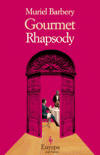Gourmet Rhapsody
Gourmet Rhapsody, Muriel Barbery’s slim but savory novel, is like poetry served on a platter – filled with dazzling and delicious language. The story begins with the world’s most famous (and most despised) food critic realizing that he will die in 48 hours. Monsieur Pierre Arthens lives in Paris, in the building immortalized in Barbery’s first novel, The Elegance of the Hedgehog.
Gourmet Rhapsody, Muriel Barbery’s slim but savory novel, is like poetry served on a platter – filled with dazzling and delicious language. The story begins with the world’s most famous (and most despised) food critic realizing that he will die in 48 hours. Monsieur Pierre Arthens lives in Paris, in the building immortalized in Barbery’s first novel, The Elegance of the Hedgehog.
Monsieur Arthens spent his life building and destroying people’s reputations without caring about the consequences. Yet now, while he’s dying, he seeks the simplicity of the one true flavor, something he tasted in his youth and cannot remember: “I am going to die and there is a flavor that has been teasing my taste buds and my heart and I simply cannot recall it. I know that this particular flavor is the first and ultimate truth of my entire life, and that it holds the key to a heart that I have since silenced.” For decades, his arrogance and prime position at the top of the restaurant food chain mask what he truly craves – the simplicity of youth. While various themes echo the 2008 Disney film Ratatouille, the book stands alone as a sublime reflection on the human soul.
Barbery traces Monsieur Arthens’s life from childhood to his famous profession in adulthood. Along the way, we share in the culinary delights of his past as he searches for the singular flavor that defined his life. We also hear from a cavalcade of characters – his wife, his children, his lover, the homeless man outside his apartment complex – all who have a very strong opinion about this arrogant and self-absorbed man. But what truly stands out is Barbery’s mastery with words. The language in Gourmet Rhapsody is something to relish, like a fine wine, crisp yet sumptuous. Sample the following sensuous passage wherein Monsieur Arthens describes his first taste of a tomato:
And yet I had always been acquainted with the tomato, since the time of aunt Marthe’s garden, since the summer when an ever more ardent sun kissed the timid little growths, since the moment my teeth tore into the flesh to splatter my tongue with the rich, warm and bountiful juice . . . The resistance of the skin – slightly taut, just enough; the luscious yield of the tissues, their seed-filled liqueur oozing to the corners of one’s lips, and that one wipes away without any fear of straining one’s fingers; this plump little globe unleashing a flood of nature inside us: a tomato, an adventure.
In another passage, Monsieur Arthens recounts watching his uncle prepare a meal. Arthens never even tasted the food, but watching his uncle’s subtle, careful preparation was his true reward that evening. He notes, “[T]his meal that I did not touch remained one of the most delicious I have ever tasted in my life. Tasting is an act of pleasure, and writing about that pleasure is an artistic gesture, but the only true work of art, in the end, is another person’s feast.”
Arthens meticulously details his first experiences with food – from meat to fish to vegetable to bread to sorbet to whisky, among other delights. He realizes that the simplest flavors are what he’s disdained throughout his career, but what call to him now on his deathbed. For example, as a critic, he always favored wine, but now feels that whisky is more rustic and more authentic as a flavor. He philosophizes:
Oh, Mephistophelean whisky, I loved you from the first swig, and betrayed you from the second – but nowhere else did I ever find, amidst the tyranny of flavors imposed upon me by my position, such a nuclear expansion capable of blasting my jaw away with delight.
While Arthens ruminates beautifully on these flavors of his past, none of them are what he seeks. And yet, he discovers again the pleasures of his youth and realizes that he not only feasted on food throughout his life, but also on what accompanies the food – the people, the conversation, the language and the atmosphere. This is authenticity; this is what’s important. Simple foods provide the best memories. He mulls over topics such as pleasure (like Alain de Botton does), fleeting happiness, aging and language. By stripping away the falseness of his job, he finds the truth. In the end, it doesn’t really matter whether Arthens will find the forgotten flavor because he ultimately returns to simplicity and shuns arrogance.
Rich and savory, Gourmet Rhapsody is a pleasure of the senses.





